
| Type of paper: | Essay |
| Categories: | Culture Psychology Mental health |
| Pages: | 3 |
| Wordcount: | 569 words |
Identify a Culture-Bound Syndrome and lists its symptoms
The culture-bound syndrome is the behavioral disturbance in a certain cultural context that is known and identified by that cultural group. In medical anthropology, it refers to the combination of somatic and psychiatric symptoms which are taken to be identifiable only with an individual society. The disease is not distinguished in whatever other culture, and it does not require any changes to the organs of the body. Initially, the culture-bound syndrome was seen not to be harmful to human beings. The syndromes were considered to be occasional and unusual: they comprised of unpredictable and disordered actions, and individuals suffering from this symptoms were seen as uncivilized
Hwabyung is a culture-related syndrome in Korea which means anger. The mental illness arises when individuals are not capable of confronting their anger as a result of situations they identify to be unfair. The main symptoms include a subjective notion of anger, feeling of unfairness, respiratory stuffiness, insomnia, headache as well as generic neurotic symptoms including anxiety and depression. The somatic symptoms are categorized by heat sensation within the body and pushing up in the chest while, behavioral symptoms are talkativeness, sighing and tearing. The symptoms appear to indicate the nature of anger and its suppression or relief. According to the patient, suffering from this syndrome, they explain that reactive anger as a result of being a victim of a bad scenario, must be suppressed to harmonize family and societal relationship.
Psychotherapy is improving the mental health
Some methods have been suggested in helping those suffering from this disorder. The first treatment is psychotherapy which is a method that is used to assist individuals to change and overcome the problem in a desired manner. Psychotherapy has helped in improving the mental health of hwabyung patients through resolving the emotions and troublesome behaviors. The second available treatment is the faith-based intervention where patients seek help from Christianity and shamanism. It has been indicated that both Christianity and shamanism are the main source of social support and comfort to hwabyung patients. The third type of intervention is family therapy whereby family members embrace a psychological counseling to patients suffering from hwabyung. Lastly, individuals suffering from hwabyung can treat by use of drugs such as anti-anxiety drugs, anti-depressants, and anti-psychotic drugs.
Hwabyung is a Korean disorder from a different traditional sentiment of Koreans which is called Haan. In Korea, Haan is identified as a chronic mixed mood of unhappiness among individuals. It has been identified as an unusual emotional reaction of Korean as a result of not only from a disastrous combined national history but from upsetting personal life which is characterized war, poor living condition, and poverty. As such, the culture of Haan is the major contributor of these disorder, and this is the reason why the disorder in prevalent in Korea.
There is a similar disorder in the United States that is prevalent among Korean American who resides in the United States. The disorder may not only be related, but the same since Korean America originated from Korea and the disorder may be influenced by the same cause of which is Haan culture.
References
Min, S. K. (2009). Hwabyung in Korea: Culture and dynamic analysis.T World cultural psychiatry research review,T 4(1), 12-21.
Sumathipala, A., Siribaddana, S. H., & Bhugra, D. (2004). Culture-bound syndromes: the story of dhat syndrome.T The British Journal of Psychiatry,T 184(3), 200-209.
Cite this page
Free Essay with the Ghost Sickness Research. (2018, Oct 01). Retrieved from https://speedypaper.com/essays/101-ghost-sickness-research
Request Removal
If you are the original author of this essay and no longer wish to have it published on the SpeedyPaper website, please click below to request its removal:
- Law Essay Example: Juvenile Incarceration
- Air Pollution Essay Sample
- Free Essay on the Effects of Self Talk on Anxiety on the Outcome of a Penalty Kick
- Amanda Writing a Letter to Tom. Essay Example.
- The Slippery Slope Fallacy, Personal Experience Essay Sample
- Essay Sample with the Published Experimental Design Checklist Comparison
- Wearable Computing and Ubiquitous Computing Augmented Fashion, Smart Textiles and IoT Augmenting Humans
Popular categories




